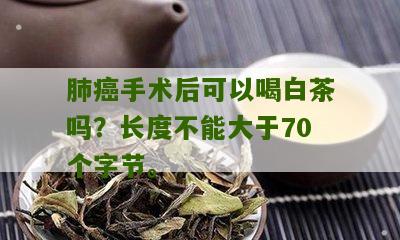肺癌术后可以喝白茶吗吗
1.白茶是一种轻度发酵的茶,因其制作过程简单,保留了茶叶的天然味道和营养成分,具有清香、滋味淡雅的特点。2.肺癌术后的肺部恢复较为缓慢,需要特别注意饮...
Title: Can one consume white tea after lung cancer surgery?
Introduction:
After undergoing lung cancer surgery, patients are often cautious about their dietary choices to support their recovery. This article aims to explore whether consuming white tea is suitable for individuals recovering from lung cancer surgery.
Understanding Lung Cancer Surgery:
Lung cancer surgery involves removing the tumor or part of the lung affected by cancer. This procedure helps in removing cancer cells and improving the patient's overall health.
Post-Surgery Diet:
After surgery, it is crucial for patients to follow a healthy diet to aid in their recovery. A balanced diet should include essential nutrients, vitamins, and minerals to support healing and boost the immune system.
White Tea and Health Benefits:
White tea, derived from the Camellia Sinensis plant, is known for its rich antioxidant content. It contains polyphenols, which possess numerous health benefits, such as reducing the risk of heart disease, promoting weight loss, and improving skin health.
White Tea and Lung Health:
White tea has properties that support lung health. It may help protect lung cells from oxidative stress and inflammation, reducing the risk of diseases like lung cancer. Some studies suggest that white tea's potential anti-cancer properties might be beneficial for post-lung cancer surgery patients.
Considerations for Post-Surgery Consumption:
While white tea offers several health benefits, its consumption after lung cancer surgery should be roached with caution. It is important to consider the following factors:
1. Consultation with Healthcare Professional: Patients should consult with their healthcare providers to ensure that drinking white tea aligns with their post-surgery dietary recommendations.
2. Sensitivity to Caffeine: White tea contains caffeine, although in lesser amounts compared to other teas. Patients who are sensitive to caffeine should consume it in moderation or opt for caffeine-free options.

3. Individual Tolerance: Each patient may have different tolerance levels and reactions to specific foods and beverages. It is essential to monitor any adverse effects experienced after consuming white tea and adjust intake accordingly.
4. Overall Diet: White tea should be considered as part of a well-balanced diet that includes various fruits, vegetables, whole grains, lean proteins, and other nourishing foods. It should not replace other essential nutrients necessary for post-surgery recovery.
Conclusion:
While white tea may offer potential health benefits for lung cancer patients, it is crucial to consult with a healthcare professional before including it in post-surgery dietary plans. Every patient's situation is unique, and individual factors should be taken into account to ensure a safe and suitable recovery process.